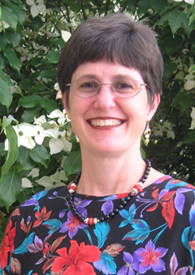Gay Brunt Miller,
 My father, both grandfathers, and one grandmother were gardeners. Dad grew a kind of cherry tomato that he really liked. He saved seeds from those tomatoes year to year to continue that particular line. When my gardening genes kicked in after I was married and I began to dig in the dirt, Dad gave me some of those seeds. Twenty years later, I still grow tomatoes from that lineage.
My father, both grandfathers, and one grandmother were gardeners. Dad grew a kind of cherry tomato that he really liked. He saved seeds from those tomatoes year to year to continue that particular line. When my gardening genes kicked in after I was married and I began to dig in the dirt, Dad gave me some of those seeds. Twenty years later, I still grow tomatoes from that lineage.
Over the years, though, I think these tomatoes have changed. I’m pretty sure Dad’s tomatoes used to be smaller. Each year I save the seeds from one of the most perfect tomatoes I can find. I only have space to grow one plant, so one seed from one plant carries on the line. Though I collect and then plant seeds that descended from my father’s heirloom tomatoes, the tomatoes that grow have changed.
It’s a story similar to transitions in Franconia Conference. Some of you collected and planted seeds from previous generations. God has blessed those seeds, and those seeds yielded fruit and created new seeds that were again replanted. Over the years, some of those seeds (ministries) have changed a bit, but they would not have been possible without the earlier “gardeners.” Earlier seeds were passed along to people like Richard Detweiler, David Derstine, Paul Lederach, and Jim Longacre. More recently Franconia Conference “gardeners” have include Charlotte Rosenberger, Walter Sawatzky, Jim Lapp, and Phil Bergey. Now, in turn, these God-given seeds are entrusted to Noel Santiago and newer staff like Jenifer Ericksen Morales to replant for future generations. While the fruit may generally stay the same, its appearance may change over time—but it will always have its lineage in those earlier seeds.
This issue of Intersections shows evidence of seeds that were planted in the past and that continue to grow, multiply and change. Phil Bergey alludes to a number of these changes in his cover article, “These three things.” One of these connections is with Indonesian Mennonites. Were it not for earlier links of people like Luke and Dot Beidler who earlier served with Mennonite Central Committee Indonesia, and connections with Mennonite World Conference, I wonder if MRN would have hosted Mesach Krisetya in 2000. If Mesach had not lived and worked among us, I doubt that the Philadelphia Praise Center would be a Franconia Conference congregation today or that Beny Krisbianto would be a pastor licensed by Franconia Conference (click to see page).
Another example: Franconia Conference connections with CIEAMM congregations in Mexico have a long history, but the way that they are being worked out has changed and is changing as more Franconia Conference congregations develop direct connections. These first-hand encounters will leave a lasting impression on the youth of Rockhill Mennonite Church (click to see page). If Walter Sawatzky and Jim Lapp had not had a vision for the vitality that Partners in Mission could bring to Franconia Conference congregations, and if the Conference Board and delegates had not embraced this opportunity, would the Rockhill youth have had their experiences in Mexico?
Without the Partner in Mission relationships, would Charlie Ness have risked reaching out to Pastor Alfredo Navea (whom he met at a conference in New York City)? And if that relationship had not developed, would Perkiomenville Mennonite Church, Franconia Conference, and now Tom and Carolyn Albright have connected to congregations in Chile (click to see page)?
There are connections with almost every article in this issue, connections to past decisions that have impacted the present and likely the future. Without these “heirloom seeds”, none of these Intersections stories could be told.
As we bid adieu to Phil, we remember him as one gardener in a long, faithful line who planted heirloom seeds of ministry. These inherited ministries may look a little different from the past and we know that God will continue to change them as they are replanted in the future. I have confidence that the “Ultimate Gardener”, will save and grow the best seeds for the next generation.
I planted the seed, Apollos watered it, but God made it grow. So neither he who plants nor he who waters is anything, but only God, who makes things grow. 1 Corinthians
3:6-7
The opinions expressed in articles posted on Mosaic’s website are those of the author and may not reflect the official policy of Mosaic Conference. Mosaic is a large conference, crossing ethnicities, geographies, generations, theologies, and politics. Each person can only speak for themselves; no one can represent “the conference.” May God give us the grace to hear what the Spirit is speaking to us through people with whom we disagree and the humility and courage to love one another even when those disagreements can’t be bridged.
